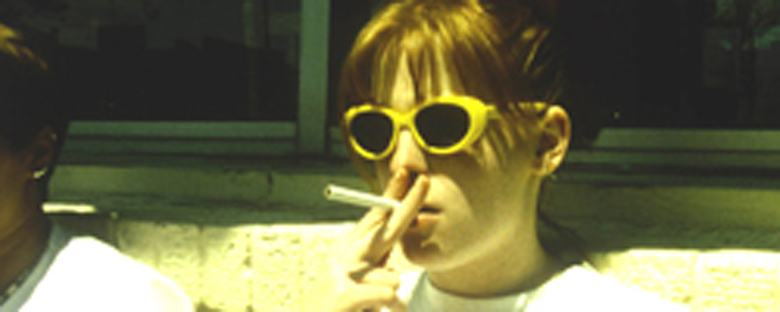Reviews
Ross McElwee
USA / UK, 2003
Credits
Review by Rumsey Taylor
Posted on 31 January 2006
Source First Run Features DVD
Related articles
McElwee Park is a patch of decently manicured sod in North Carolina. It is adjacent to a former tobacco warehouse, now an archive for a local thrift store, and usually absent of any tenants, human or otherwise. In one corner is a pair of wooden benches and a tree. This is somewhere in the middle of a modestly populated southern town.
Named after John McElwee, tobacco tycoon and rival to James Buchanan Duke in the late 1800s, the park is the final retainer of his legacy—that, and his tombstone, which, his family notices late in this film, is bumped around by a lawn mower. This legacy is in stark contrast to that of Duke, the namesake of Duke University and dozens of other notable architectures that populate North Carolina. The two were rivals, but Duke’s industry prevailed with the purchase of a cigarette rolling machine. McElwee, preferring an assembly line of workers, was survived by few mentions in the annals of history.
A 1950 film entitled Bright Leaf enunciates — to some extent but with some ambiguity — the competition between the two men. It profiles two tobacco tycoons in the melodramatic throes of rivalry; one is a millionaire, the other a modest workman—an underdog who, at the story’s end, watches stoically as a fire engulfs his plantation, insisting furiously that no one attempt to assuage the flames. He is doomed to be absent of any legacy.
Ross McElwee becomes obsessed with this film because he perceives it as an indirect pronunciation of his great-grandfather’s placement in local history. An expatriate of the south, McElwee (the junior) moved to Cambridge, Massachusetts, and initiated a career in documentary filmmaking. (At the time of this writing, he teaches filmmaking at Harvard.) “Autobiography” is more appropriate in categorizing his films than documentary, as he and his life is very much the subject (directly or not) of everything he films. In a late scene in Bright Leaves, he interviews patients with terminal lung cancer at a local hospitable, and his son is enlisted to record sound. During the interview, Ross directs his camera towards his son repeatedly, ignoring, ostensibly, his interview, but the paternal gesture echoes that of the film: his son is his prized legacy, and to observe him sporting a sound kit is a sort of potential elucidation of his own legacy, one that his great-grandfather may not have shared.
McElwee is informed of Bright Leaf and its potential basis on his family from a cousin. This thesis inspires his investigation, constructed in meticulous deconstruction of the film and an interview with the novelist’s surviving wife, who announces with finality the story’s lack of direct association with any person, living or deceased. This epiphany made, the flaws in any correspondence between the film and the McElwee ancestry are now known. Ross does not alert his family to this discovery, preferring to sustain their modest admiration as he films their observation of John McElwee’s unexceptional tombstone.
Bright Leaves thrives, at times, upon self-effacement. Easily, this film could have been manipulated to invigorate citations of John McElwee’s influence in the tobacco industry, and to summarily contest the capitalism that sheepishly fuels it (most of the world’s supply is grown in North Carolina, and this is not to say this theme isn’t apparent herein). In admitting the faults of his thesis, McElwee grants his film an improved relevance. There is a wonderful scene in which he interviews film theorist Vlada Petric. The interviewee, striving for “cinema,” insists that McElwee film him from a wheelchair as he is wheeled around the block, during which he rambles on the futility of McElwee’s film, the illogic of interviewing him, and other topics that have no immediate pertinence. Petric is incorrect: his obnoxious personality and wild theorizing characterizes this, the film’s most conventionally cinematic scene. He cuts in the middle of one of Petric’s excited, elaborately gestured sentences.
We don’t do comments anymore, but you may contact us here or find us on Twitter or Facebook.



